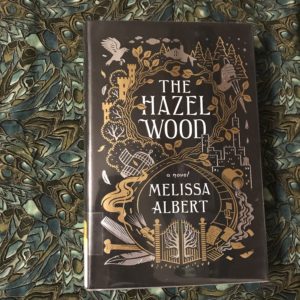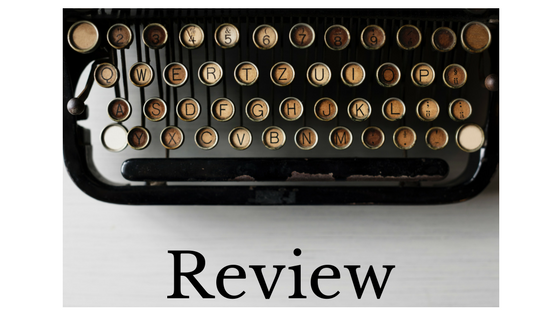There are no lessons in it. There’s just this harsh, horrible world touched with beautiful magic, where shity things happen. And they don’t happen for a reason, or in threes, or in a way that looks like justice. They’re set in a place that has no rules and doesn’t want any. And the author’s voice –your grandmother’s voice—is perfectly pitiless. She’s like a war reporter who doesn’t give a fuck.
-Ellery Finch on The Tales from the Hinterland
 Synopsis
Synopsis
For as long as she can remember, Alice and her mother have been running, running from bad luck, running from recognition. Until one day they can’t run far enough and Ella is taken, leaving no clues except the warning to “Stay Away from the Hazel Wood,” the estate of Alice’s reclusive fairytale-telling grandmother. As one would expect, Alice promptly sets out for The Hazel Wood in search of her mother, only to find truths about herself instead.
Darkness
I came to The Hazel Wood with some anticipation. I loved Girls Made of Snow and Glass and this was recommended as an up-and-coming book for fans who enjoyed Girls. With that said, the books are very different. Even having read the description, I didn’t anticipate how dark The Hazel Wood would be. The Hazel Wood is more Grimm Brothers than it is Hans Christian Anderson.
At the heart of The Hazel Wood is a fictional book—Tales From The Hinterland—written by Alice’s grandmother. Several of the stories are retold as vignettes in The Hazel Wood and others’ characters assert themselves into the narrative often enough for me to draw the conclusion that absolutely none of them end happily and not usually for any particular point. There is no allegory to the Hinterland Tales. Just usually misery. With these tales as the backbone of The Hazel Woods’ narrative, it’s not surprising the book starts pretty dark and only gets darker. (Which is not to say the narrative doesn’t have a satisfying resolution—there isn’t darkness for darkness sake and the characters do each have arcs that resolve, even if everything isn’t Happily Ever After.)
Characters
The main character Alice was someone designed to have the reader identify with her—she isn’t in the popular crowd, she’s a little weird, and she feels disconnected from people around her. In this way Alice is the EveryGirl of YA books and could easily have felt a bit like a trope of the damaged teen girl with shades of Alice in Wonderland (though the author says this name-nod isn’t a choice to give the Alice in Wonderland tale any more weight than any other fairytale reference). Despite this beginning, as Albert spun The Hazel Wood, I grew quickly more connected to Alice and invested in her story. Alice didn’t feel overwrought or like a recycled character but her own person. Indeed, through Alice, Albert introduces themes of agency in one’s story that felt all the more powerful with the parallels to fairytale Alice, who had little control over her story in Wonderland. Alice did strike other reviewers as unnecessarily rude, self-centered, and prone to violence; however, this aspect of Alice’s character is explained as you learn more about who she is—these characteristics are part of the overall larger point about agency in one’s story and even in one’s person. I didn’t find these to detract and, in my reading, they served a purpose. With that said, if you can’t get into this story after about fifty pages and Alice is your hangup, this isn’t the book for you.
The other two significant characters (in terms of their impact on Alice and/or time in the narrative) are Ellery Finch and Ella, Alice’s mother. Ellery is a bit of a fairy godmother, if one’s fairy godmother were a teenage boy with an unlimited charge card. His money took the place of the godmother’s wand and made what would have been otherwise expensively impossible leaps in the story more plausible (to the extent that its plausible to have a friend with this kind of money—although, fairytales aren’t usually known for their plausibility so it works.) He is, to an extent, a love interest for Alice though that never goes deeper than a crush and awkward request for a first date that doesn’t really happen (unless you count going on an epic quest where someone might be killed a date. Then there’s one date.) Romance isn’t the point of the book and Albert doesn’t go there just to go there, which I appreciated. When there comes a point at which it looks like Alice might need rescuing, her rescuer isn’t Ellery alone—he’s not the Prince Charming in this book, nor does Alice need one. A potentially problematic point raised by other reviewers is Alice’s description of Ellery as someone she doesn’t find attractive—I didn’t particularly pay attention to this, interpreting it as Albert’s way of making it clear this wasn’t a romance and Alice doesn’t need a man. With that said, Ellery is also the only character described as being black/bi-racial so having the only character of color be someone the narrator specifically mentions she isn’t attracted to is understandably problematic. If Albert’s point what was I interpreted it as, she needed more characters of color so that this didn’t stick out.
I didn’t get quite enough of Ellery or of Ella, frankly. We spend very little time with Ella and only come to care for her by rooting for Alice and coming to love what (and who) she loves. Both of them were present enough for me to think I liked them but I don’t feel like I have enough information. What I’d like is a novella from each—Ellery of his experience of the same events told in The Hazel Wood and Ella as a prequel to the events that laid the foundation for the events in The Hazel Wood. (If someone knows Melissa Albert and would like to make that happen, thanks in advance.)
Easter Eggs
You’d be hard-pressed to catch every fairy tale, fandom, or feminist reference here. I’m pretty sure at one point there’s a nod to The Yellow Wallpaper and Harry Potter references abound. Outside of the narrative, these were fun little easter eggs, though some of the obvious ones that came in clusters here and there felt a touch like namedropping or trying to hard to curry favor with the fandom crowd. The annoyance I felt over this was more the feeling that these clusters that caught my attention pulled me out of the narrative, forcing me to surface when I had been deep in the story up to that point. The best books are the ones where you’re so immersed you forget you’re reading and not living the story. The Hazel Wood had this quality at points, though when these references were clustered and about fandoms (as opposed to about fairytales), it detracted a bit. With that said, if you’ve been living under a rock for the last ten years, you won’t miss anything if you miss each and every reference. While they mostly add detail to the narrative, they aren’t necessary to any part of the plot or character development such that you’d miss anything if you missed them all.
Recommended
The book read a bit like an older YA book in themes and style. Unless an adult reader has a particular interest in either YA or fairytales, this one will likely miss the mark for an adult reader who doesn’t usually read YA. For actual young adults and adult readers of YA, I do think this is a book that will worth the time investment of reading.
Alice as a protagonist is strong and capable and the twists in the plot felt original. I’m a sucker for books that raise the issue of agency and the control we have over each of our stories, so that stood out for me as a strength. The book is plot-driven enough that if you’re looking for a fun diversion (as opposed to something that will force you to ponder the secrets of the universe and the meaning of life), I do think this book will still be engaging and worth your time (though you may find it drags a bit through the last chapters as time passes differently and the plot literally slows down). If you do prefer to ponder the meaning of life, there’s also substance in this fractured fairytale for you.
Notes
Published: January 30, 2018 by Flatiron Books (@flatiron_books)
Author: Melissa Albert (@melissaalbertauthor)
Date read: March 11, 2018
Rating: 3 ¾ stars

